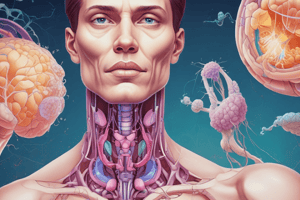Podcast
Questions and Answers
What is the primary function of the thyroid gland?
What is the primary function of the thyroid gland?
- Regulating body temperature
- Controlling growth and development
- Managing energy levels
- All of the above (correct)
What is the primary function of thyroglobulin in the thyroid follicles?
What is the primary function of thyroglobulin in the thyroid follicles?
Thyroglobulin serves as a storage for thyroid hormones T4 and T3 in the thyroid follicles.
Thyroid-stimulating hormone (TSH) is released from the hypothalamus.
Thyroid-stimulating hormone (TSH) is released from the hypothalamus.
False (B)
_______ is the primary iodide metabolism product excreted in the urine.
_______ is the primary iodide metabolism product excreted in the urine.
What is the main use of radioactive iodine (131I) in anti-thyroid treatment?
What is the main use of radioactive iodine (131I) in anti-thyroid treatment?
Flashcards are hidden until you start studying
Study Notes
Thyroid Hormone and Anti-Thyroid Drugs
Thyroid Gland
- Normalizes growth and development, body temperature, and energy levels
Synthesis, Storage, and Secretion of Thyroid Hormones
- Functional unit of the thyroid gland is the follicle
- Each follicle consists of a single layer of epithelial cells around a cavity filled with a thick colloid containing thyroglobulin
- Thyroglobulin is a large glycoprotein containing tyrosine residues
- Surrounding the follicles is a dense capillary network with high blood flow
Transport of Thyroid Hormones
- T4 and T3 in plasma are reversibly bound to protein, primarily thyroxine-binding globulin (TBG)
Peripheral Metabolism of Thyroid Hormones
- Primary pathway for peripheral metabolism of thyroxine is deiodination
- Deiodination of T4 may occur by monodeiodination of the outer ring, producing T3, or by monodeiodination of the inner ring, producing reverse T3 (rT3)
Iodide Metabolism
- Recommended daily adult iodide intake is 150 mcg (200 mcg during pregnancy)
- Iodide is ingested from food, water, or medication and removed from the body through urine
Regulation of Thyroid Function
- Thyrotrophin-releasing hormone (TRH) releases thyroid-stimulating hormone (TSH) from the anterior pituitary
- TSH acts on receptors on the membrane of thyroid follicle cells, controlling hormone synthesis, including iodide uptake, endocytosis, and proteolysis of thyroglobulin, and secretion of T3 and T4
Actions of Thyroid Hormones
- Physiological actions of thyroid hormones fall into two main categories: metabolism and growth and development
- Thyroid hormones produce a general increase in metabolism of carbohydrates, fats, and proteins, and regulate these processes in most tissues
- Thyroid hormones also influence growth hormone production and potentiate its effects on target tissues
Abnormalities of Thyroid Function
- Hypothyroidism: characterized by fatigue, constipation, weight gain, cold intolerance, deep voice, and dry skin
- Hyperthyroidism (thyrotoxicosis): characterized by excessive secretion and activity of thyroid hormones, resulting in a high metabolic rate, increased skin temperature, and heat intolerance
Hormone Replacement Therapy in Hypothyroidism
- No drugs that boost synthesis or release of thyroid hormones
- Only effective treatment for hypothyroidism is to administer thyroid hormones themselves as replacement therapy
Anti-Thyroid Drugs in Hyperthyroidism
Thioamides
- Methimazole and propylthiouracil are major drugs for treatment of thyrotoxicosis
- Carbimazole is converted to methimazole in vivo
- Methimazole is about ten times more potent than propylthiouracil and is the drug of choice in adults and children
- Black box warning for severe hepatitis and increased risk of birth defects
Anion Inhibitors
- Perchlorate (ClO4-) and thiocyanate (SCN-) can block uptake of iodide by the gland through competitive inhibition
- Potassium perchlorate is rarely used clinically due to association with aplastic anemia
Iodides
- Iodides have several actions on the thyroid, including inhibition of organification and hormone release, and decrease in size and vascularity of the hyperplastic gland
- Main use of iodine/iodide is for preparation of hyperthyroid subjects for surgical resection of the gland
Radioactive Iodine
- 131I is the only isotope used for treatment of thyrotoxicosis
- Administered orally, it is rapidly absorbed, concentrated by the thyroid, and incorporated into storage follicles
- Therapeutic effect depends on emission of β rays with an effective half-life of 5 days
- Hypothyroidism will eventually occur after treatment
Adrenoreceptor-Blocking Agents
- Beta blockers without intrinsic sympathomimetic activity (e.g., metoprolol, propranolol, atenolol) are effective therapeutic adjuncts in the management of thyrotoxicosis
- Propranolol has been the β blocker most widely studied and used in the therapy of thyrotoxicosis
Studying That Suits You
Use AI to generate personalized quizzes and flashcards to suit your learning preferences.



